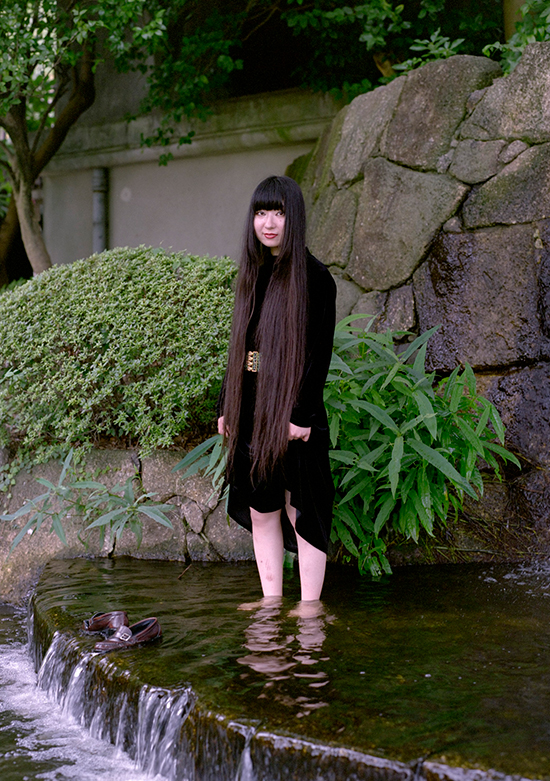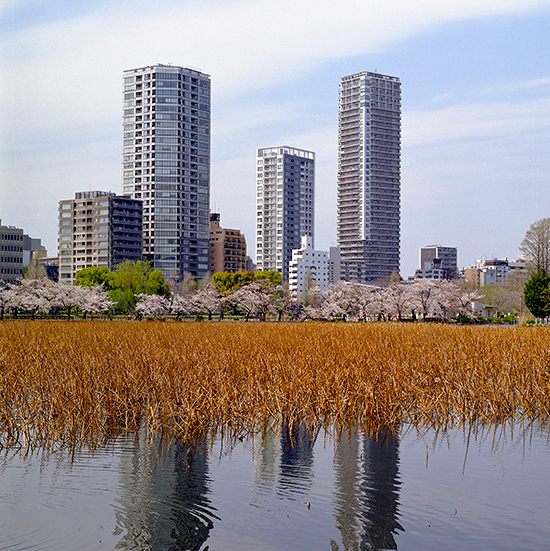Floating – a photo installation curated by Tofu Collective x WAAITT
10 remarkable contemporary photographers inhabit the lunchroom at ToRS and connect different geographical areas through water as a connecting theme.
The Danish art association Tofu Collective, in collaboration with ToRS and the creative studio WAAITT, has realized an art installation consisting of 14 photographs for the institute's lunch room, the meeting room in extension thereof and the wall surface by the spiral staircase on the 3rd floor at the entrance of the lunch room. With a focus on diversity across the world's oceans, Tofu Collective has brought together 10 artists from Japan, Lebanon, China, Serbia, Korea, Ukraine, Greenland and Bahrain, who have contributed with works that both express and represents fragments of various places on earth and at the same time opens up a transcultural perspective by meeting around the water we are all surrounded by.
Water is both what connects us and separates us – what we travel across to experience, investigate, explore and collaborate, but also what separates the borders between us, constitutes conflict zones, refugee flows and what stands both in its overrepresentation and the lack of it as a visual mark of the global climate changes we are collectively facing. ToRS helps to create space for negotiation and coherence between the phenomena that connect us and divide us - to find meaning and nuances in what is fluid, ever-changing and whose coherence constitutes many of the issues we face today.
Together, the artists' contributions form a selection of works that is characterized by diversity, has a contemporary scope, creates contexts for the institute's research areas and possesses a forward-looking perspective that will be relevant and contribute to curiosity, reflection and dialogue among the lunch room's users for many years to come.
Involved artists
- Ali Al Shehabi
- Genia Volkov
- Jukke Rosing
- Julia Kaydala
- Lin Zhipeng
- Luo Yang
- Maya Akashika
- Mohamad Abdouni
- Seunggu Kim
- Yuta Fuchikama
Ali Al Shehabi (1994 Jidhafs, BH – A’Ali, BH)
Ali Al Shehabi is a photographer born in Bahrain and raised in Dubai. As an exploration of the nostalgia connected to his upbringing in the two areas, his practice stands as a visual documentation of the contemporary Arab youth culture in-between tradition and change staged at the intersection of recreations of his childhood memories and contemporary phenomena. Ali Al Shehabi initially pursued a degree in petroleum engineering, but decided after getting an interest in photography during the recovery of an accident to move to Tokyo to study art followed by a degree in photography in Dubai.
While his early explorations revolved around the city’s streets, Ali Al Shehabi realised that the image and understanding of Arab culture that was being exported around the world was often reductive. The two works featured in the installation Floating are part of his ongoing vision of portraying the diversity of the Arabian Peninsula through contemporary depictions inspired by his personal memories, movies, music videos and pictures from his family's photo albums to confront and challenge the international notion of the area. Ali Al Shehabi’s work has been exhibited at L’Art Pur Gallery in Riyadh and Cortona On The Move as well as been featured in numerous magazines including VICE and GQ.
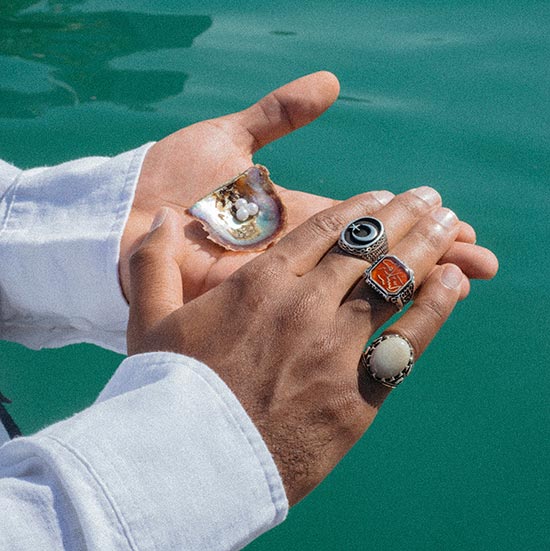

Genia Volkov (1981 Crimea, UA – Paris, FR)
Genia Volkov is a Paris-based artist from Ukraine working in photography and film. His work seeks to reclaim the term “documentary photography” by questioning whether our desire to document our lives turns us into images. Confessional and instinctual, although Volkov’s photographs have vivid subject matter, their magnetism streams from the enigmatic eloquence of the narrator’s voice. Ranging from intimate erotic diaries to architecturally linear landscape shots and radiant, neon-lit figures, they are philosophical chronicles of the irrepressible passage of time, celebrating its joys and exploring transformations, set against the backdrop of the artist’s travels, brooding energies of political landscape and changing seasons.
The photo featured in the installation Floating was taken before the birth of his son during a vacation in Odessa, Ukraine. It is associated with a carefree time every parent is familiar with and with the transition to a more adult period afterwards. Genia Volkov attended the Institute of Journalism in Kiev and is part of the Join The Cool collective. His work has been exhibited at Sheriff gallery in France, Galeria Zcwartek in Poland, the International Summer School of Photography in Latvia and Seentax Services in Ukraine, and published in magazines such as i-D, Purple Fashion magazine, Vogue, Dazed and British Journal of Photography.
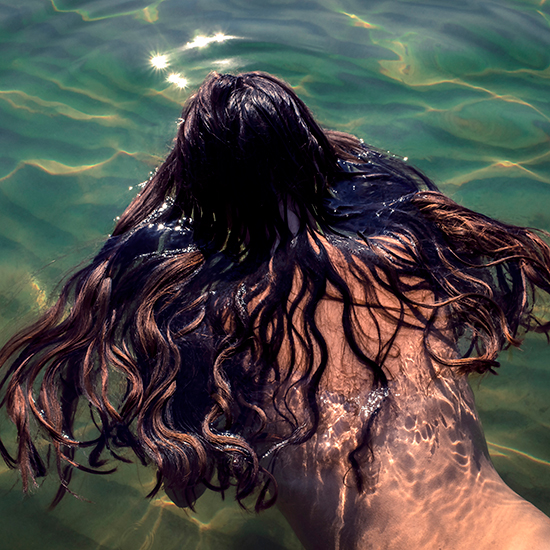
Jukke Rosing (1984 Nuuk, GL – Ærø, DK)
Jukke Rosing is a photo artist from Greenland who lives and works in Denmark. Rosing's works stand as fragments of the artist's cultural affiliation to Greenland, which she investigates and communicates through poetic and dreamy photographic works that are based on her own identity, longing and love for her homeland, and the connotations that in Denmark are connected to the area. The featured photograph in the installation Floating processes the concept of justice, which is often represented through the goddess of justice Justitia. In her work, Rosing has interpreted Justitia in a Greenlandic setting by drawing spiritual parallels to mythology and femininity in Greenland, which stands as an image of the concept of justice in the field of tension between Greenland's past and future.
Jukke Rosing's photographic practice began in 2005 at the Scandinavian Design College in Randers, where she studied fashion design and photography. The year after, she moved to New York where she studied at the International Center of Photography, followed by attending Fatamorgana – The Danish School of Art Photography. Her works have been exhibited at Nordatlantens Brygge in Copenhagen, Nuuk Contemporary Art Museum, Fotografisk Center in Copenhagen and Det Grønlandske Hus in Copenhagen.
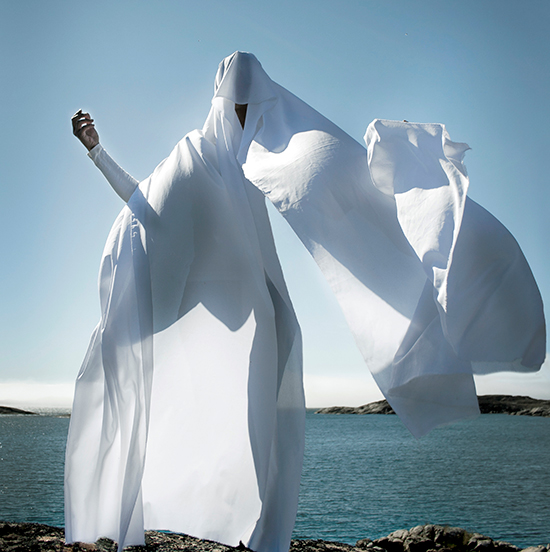
Julia Kaydala (2001 Moscow, RU – Belgrade, RS)
Julia Kaydala is a Serbia-based, self-taught photographer from Russia mainly working with portraits. Her practice is characterized by escapism creating a new backdrop for Russia’s Gen Z. Often depicted in settings, where she can let her spontaneous nature shine and the raw emotions gleam like soft light on the water, the people in front of Kaydala’s lens are friends and peers, who lightheartedly attend her adventures.
The photo featured in the installation Floating tells the story of a friend, the artist didn’t see for a long time after she moved to Spain. Noticing each other's changes in new cultural settings, barely noticeable, occurring at the level of energy and sensations, the artist tries to rethink the meaning of each of them in each other's lives reflecting their meeting, a forgotten feeling, a state of rest in a restless head, an attempt to affect each other’s life and preserve their cultural origin. The artist’s works has been published in the Calvert Journal, GLOW, Badlon Magazine and Wul Magazine.

Lin Zhipeng (1979 Shantou, CH – Beijing, CH)
Through a raw and lively snapshot-aesthetic balancing preparation and improvisation, Lin Zhipeng creates explicit and playful representations of the desires and freedoms sought by a liberated youth who indulge in love and life, oscillating between jubilation and melancholy. These are expressed through the body as an aesthetic focal point, culminating into a not-so-private diary of the artist’s own circle of friends. The featured photo in the installation Floating is product of this big catalogue of deeply personal photographs he has created the last 20 years.
Lin Zhipeng (b. 1979, Shantou, China) – aka No. 223, a pseudonym taken from the police character in Wong Kar-Wai’s movie Chungking Express (1994) – graduated from Guangdong University of Foreign Studies in 2000 with a major in financial English. Lin Zhipeng soon became a leading figure of the next generation of photographers in China, popularizing his work initially via social media, online platforms, and self-published zines. A Beijing-based photographer and freelance writer, his work has since been exhibited worldwide, including at MEP in Paris, Delaware Contemporary Museum, Walther Collection in Ulm, and Apalazzo Gallery in Bescia, Italy.

Luo Yang (1984 Shenyang, CN – Shanghai, CN)
Luo Yang’s poetic and honest portraits captured in intimate scenes explore themes of freedom, diversity and independence while challenging traditional beliefs about beauty, identity, and gender – representative of a Chinese youth culture defying societally imposed expectations and conservative stereotypes. For the installation Floating, Luo Yang has contributed photographs from two of her most acclaimed portrait-series, Girls (2008-2016) and Youth (2019-). Girls explores female identities, and each portrait serves as a testament to the portrayed subject’s individuality. Youth depicts today’s adolescents, who grew up in a time when China underwent significant changes. Through honest, vulnerable and self-examining portraits, Luo Yang explores a more fluid definition of gender and individuality in an often-overlooked Chinese youth culture.
Luo Yang (b. 1984, Shenyang, China) graduated from the Lu Xun Academy of Fine Arts in Shenyang in 2009. A graphic designer by education, she decided to pursue her interest and talent in photography instead. Today, she lives and works as a photographer in Shanghai. A leading voice in the new wave of contemporary Chinese photography, Luo Yang was named one of BBC’s 100 Women in 2018, among her many other accolades. Her works have been exhibited worldwide, including at Stieglitz19 in Antwerp, MO-Industries Gallery in Berlin and Ai Weiwei’s Fuck Off 2 (2013) at Groninger Museum in the Netherlands.

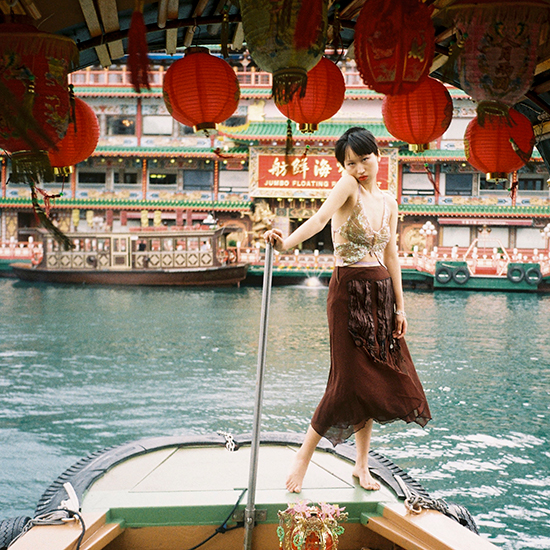
Maya Akashika (1985 Osaka, JP)
Maya Akashika is an Osaka-based photographer concocting inimitable story-worlds in which reality and fantasy intermingle, traversing a multitude of images in a multisensory manner. Through her practice, Maya Akashika processes the concept of tokimeku (spark joy) in everyday life, which she explores by translating the intersection between emotional expressions and sensual experiences into images depicting coincidential smiles, dripping tears of joy or the act of eating chicken thighs or ice cream cones. The photo featured in the installation Floating is from her series Eating Wind (2011) which won the 34th Canon New Cosmos of Photography Grand Prize depicting an extremely eccentric and still world with roused desire encapsulated within a dangerous game.
Maya Akashika holds a degree from Kansai University in Linguistics and Literature and a degree in photography from Visual Arts College Osaka. Her work has been exhibited in various locations including Tokyo Metropolitan Museum of Photography, KANZAN Gallery in Tokyo, ChocoChoco Gallery in Hualien, Taiwan, Bloom Gallery in Osaka and The Nakanoshima Museum of Art in Osaka.
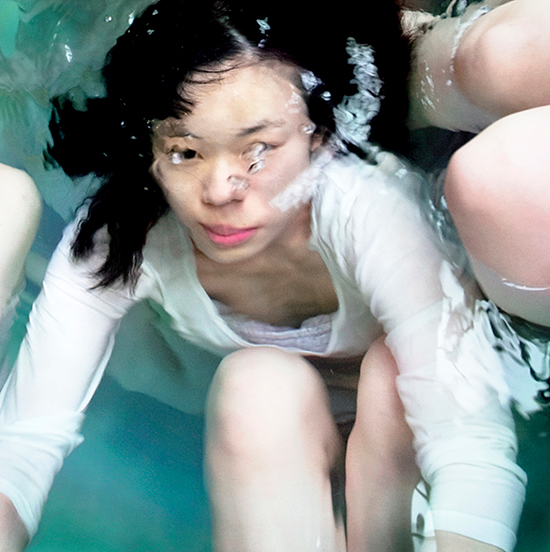
Mohamad Abdouni (1989 Beirut, LB)
Mohamad Abdouni is a photographer, filmmaker and curator based between Beirut and Istanbul.
His photographs are embedded in his repeated attempts at retrieving a collective memory that has been lost along the way, or in his efforts to make sense of the persisting impact of deliberate battles with personal recollections. In portraits and first-person encounters, his work develops into a variety of storytelling formats that focus on the untold stories of Beirut and the rich yet eradicated queer stories of resilience, fragility and vitality that are related to LGBTQIA+ generations in the SWANA region as expressed through the works featured in the installation Floating.
Abdouni’s collaborative journal of photography Cold Cuts, which is widely credited to be the first publication dedicated to queer cultures in the Middle East, documents and supports localized outgrowths of queer identities and communities that are fundamentally different from their regional and Western counterparts in their expressions of queerness, cultural developments, and political agendas. His work has been featured in several exhibitions and festivals including the Brooklyn Museum in New York, the FOAM Gallery in Amsterdam, L’Institut du Monde Arabe and the Institute of Islamic Culture in Paris, Patel Brown in Toronto, Photo Arles and the Lyon Biennale, and been published in magazines, journals and newspapers including A24, Telerama, Foam Magazine, Tetu, New Queer Photography, Kaleidoscope, i-D, Photoworks, The Guardian, Dazed, Vogue, Nowness and more.
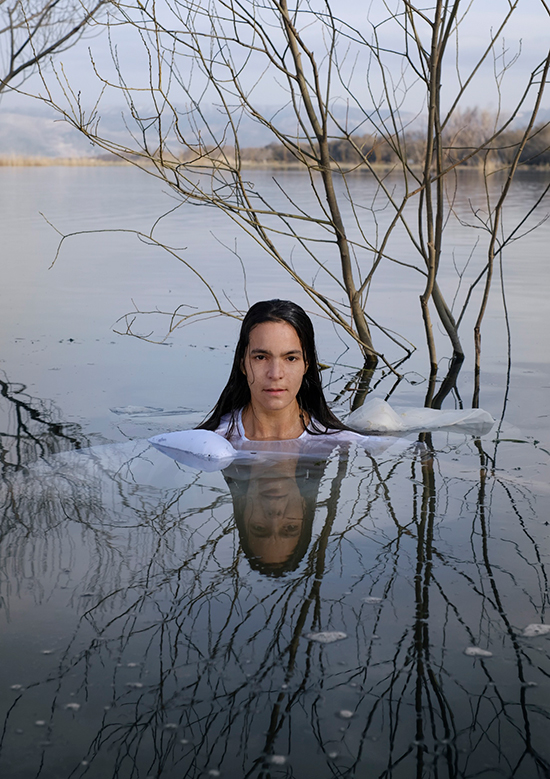

Seunggu Kim (1979 Seoul, KR)
Seunggu Kim is a Seoul-based photographer working with detailed large-scale images to depict an expanse of people's lifestyles in South Korea. The work featured in the installation Floating is part of the artist’s photo series Better Days exploring staycation among the locals due to very short period of holidays with lack of time to travel as a result of the countries rapid development the last 40 years. The photo series depicts collective leisure and its environment revealing the attitude of Koreans living with optimism and a sense of community despite social constraints.
Seunggu Kim holds BFA in photography from Sangmyung University, and MFA in visual art from Korea National University of Arts. His work has been exhibited internationally including at Filter Space in Chicago, The Korea Society in New York, Aperture Gallery in New York, Format Photography Festival in Derby, Three Shadows Photography Art Centre in Beijing, Seoul Museum of Art, and Gyeonggi Museum of Modern Art in Seoul. Amongst others, he has won prizes such as Houston FotoFest, Tokyo International Photography Competition, and Korean Photographer’s Fellowship of the year.

Yuta Fuchikama (1987 Gifu, JP – Tokyo, JP)
Yuta Fuchikami is a Tokyo-based photographer curiously and intuitively portraying the myriad personalities and urban occurrences he encounters in Tokyo. The photos featured in the installation Floating are both part of his ongoing photo series Ueno Park depicting rough-hewn eccentricities and foibles of various scenarios and diverse groups and individuals of Shinobazu. The series stands as a contemporary and persuasive portrait of the area’s variety of contrasting identities and expressions of beauty in the green surroundings as mise-en-scene for his raw and crisp documentations.
Yuta Fuchikami holds a degree in photography from Nagoya Visual Arts Department of Photography. His work has been exhibited at Totem Pole Photo Gallery in Tokyo, Art Gallery Nagoya, Place M in Tokyo, and is part of the permanent collection of Kiyosato Photo Art Museum. He has won several prizes including Pitch Grant 2021, Portrait of Japan 2021 and Shiogama Photo Festival Grand Prize.
